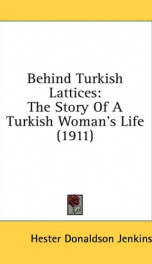behind turkish lattices the story of a turkish womans life

Hester Donaldson Jenkins (1869-1941), a professor at the American College for Girls in Constantinople from 1900-1909, wrote enthusiastically about the Young Turks, who in 1908 established a constitutional monarchy in the Ottoman Empire. They seemed to Jenkins to promise new freedoms for Ottoman women. In this book Jenkins uses her own observations of Constantinople, her students, and their families to construct an account of a "typical" Turkish Muslim woman's life cycle at this turning point in Ottoman history. She intends her comments on childhood, education, marriage, polygamy, and divorce to correct Western misapprehensions and she notes how Ottoman women selectively adopted Western customs, such as European clothing, and increasingly practiced monogamy. Jenkins's corrective is only partial, however, for she describes Turkish women as childishly charming but sadly ignorant and in need of the uplifting influences of Western education. In its confidence in the bright prospects of American influence and Ottoman reform, this book captures an optimistic moment in which social progress seemed to prevail against the looming social and ethnic divisions of the Balkan and First World Wars. Carolyn Goffman is Visiting Assistant Professor in the Department of English, DePaul University, Chicago, IL, USA. Cultures in Dialogue returns to print sources by women writers from the East and West. Series One considers the exchanges between Ottoman, British, and American women from the 1880s to the 1940s. Their varied responses to dilemmas such as nationalism, female emancipation, race relations and modernization in the context of the stereotypes characteristic of Western harem literature reframe the historical tensions between Eastern and Western cultures, offering a nuanced understanding of their current manifestations. --This text refers to an alternate Hardcover edition.
Info about the book
Author:
Series:
Unknown
ISBN:
0521523036
Rating:
2.5/5 (2)Your rating:
0/5
Languge:
English
Users who have this book
Users who want this book
What readers are saying
What do you think? Write your own comment on this book!
write a commentGenre
if you like behind turkish lattices the story of a turkish womans life try:
Other books by this author
Do you want to read a book that interests you? It’s EASY!
Create an account and send a request for reading to other users on the Webpage of the book!


